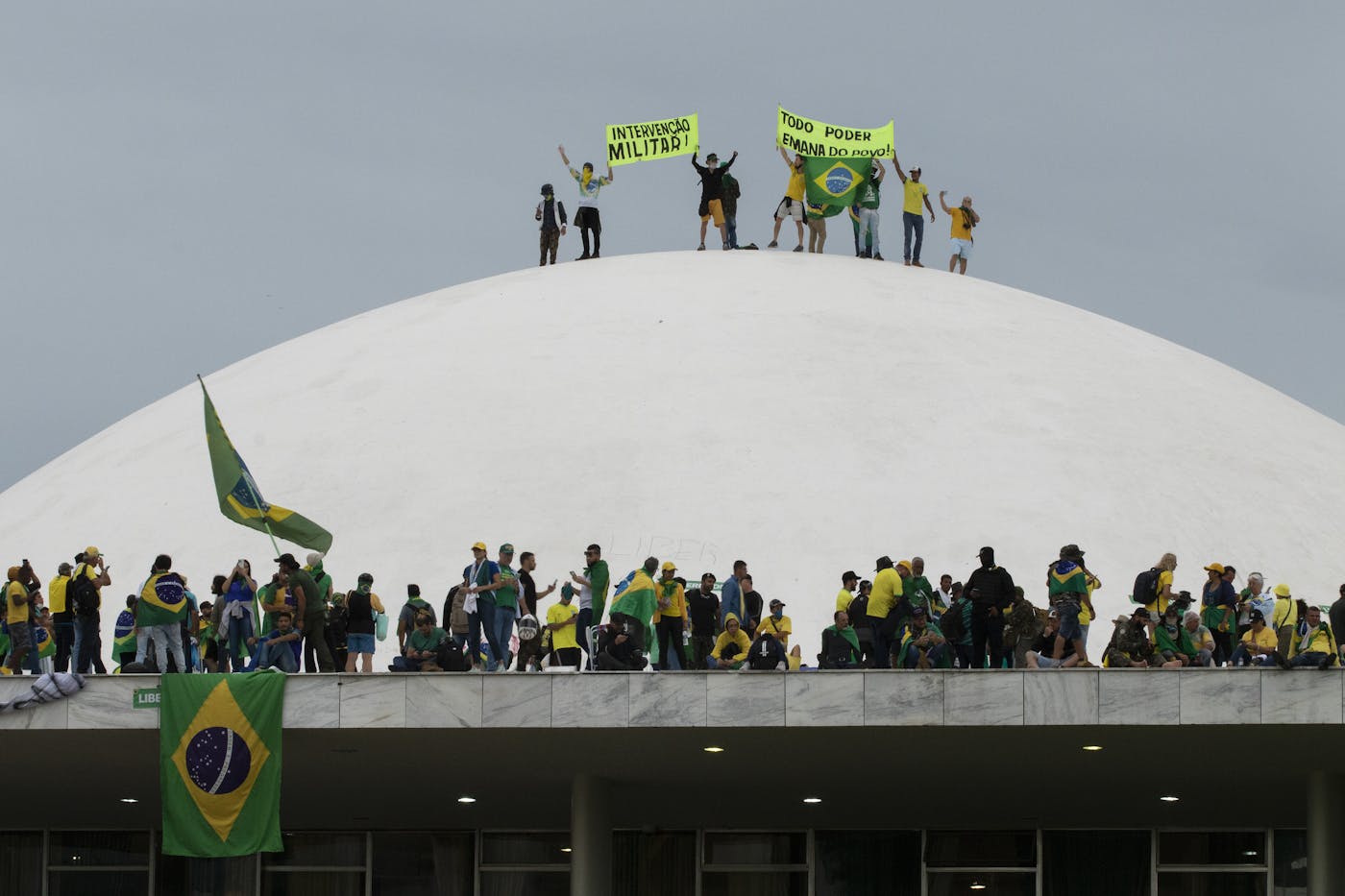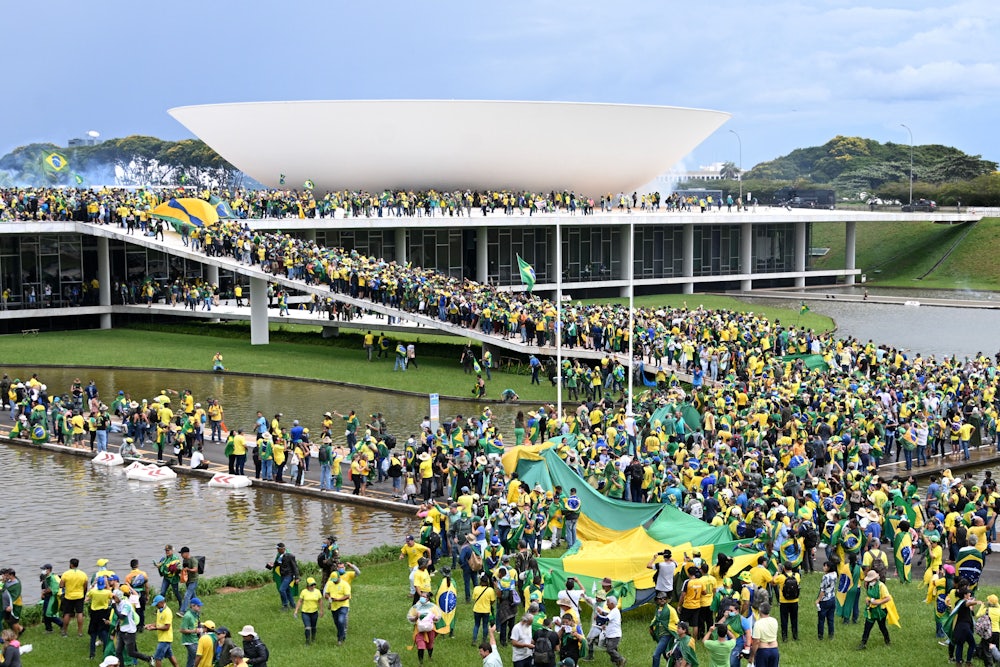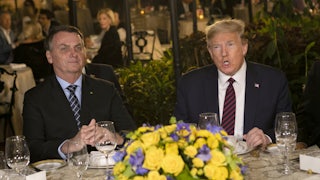The new year came and went, with Brazilian President Luiz Inácio Lula da Silva safely sworn in on January 1 despite calls to annul the election from the most ardent supporters of former President Jair Bolsonaro. I attended the inauguration in Brasília, and my hotel was across the street from Lula’s. The street was packed with police and security vehicles. At one point, a handful of dejected Bolsonaro supporters sauntered by, half-heartedly shouting anti-Lula slogans. “Come on,” one called to his comrade, “it’s over.” They left without incident.
The incident came on January 8. Bolsonaro die-hards, meeting shockingly little resistance from security forces in a capital city governed by a Bolsonaro supporter, invaded several government buildings in an eerie reenactment of the January 6, 2021, insurrection at the U.S. Capitol. The offices of the Supreme Court, a frequent adversary of Bolsonaro during his four years in office, were trashed. Crowds clad in the national colors scurried in, around, and over the national legislature like green and yellow ants. Some meandered across the lawns of the presidential palace. Unlike what happened in Washington two years ago, however, elected representatives were not in Brasília. Nobody’s life seems to have been in danger, which in no way diminishes the gravity of this strike on the symbolic arenas of Brazilian democracy.
Sunday’s events were the culmination of a simmering pro-coup sentiment among Bolsonaro’s most fervent backers since October 30 when Lula defeated the incumbent, a feat no challenger had accomplished since it became possible for presidents in Brazil to seek reelection in 1997. Across the country, small but vocal bands of Bolsonaro supporters camped outside military barracks urging the armed forces to intervene. Latin America’s largest nation was governed by a military dictatorship from 1964 to 1985, making the possibility of a coup remote but not unthinkable. A prior riotous outburst took place on December 12, “a flash of post-election violence on the day the president’s electoral defeat was certified,” as Reuters reported at the time. A bomb scare also raised alarm late last year. Little came of these antics. Shortly before Lula was to be sworn in, Bolsonaro unceremoniously left the country for Florida, refusing to hand power to the man who bested him at the polls. Once Lula’s inauguration proceeded without a hitch, it was thought that that earlier episode might be the worst of it.
But the attack on three government buildings suggests that the challenge to Brazilian democracy has transcended Bolsonaro. The right-wing extremist who stunned Brazil’s political establishment to win power in 2018 is fading politically, dismissed by erstwhile allies and mocked online for his mundane outings as a Florida Man. His time in office, however, activated a long-running reactionary strain in Brazilian democracy that is deeply hostile to democracy. In the run-up to the 1964 coup, for example, thousands of Brazilians took to the streets in the name of anti-communism to call for the ouster of a democratically elected president associated with the left. Those demonstrations paved the way for a bloody military dictatorship that lasted 21 years. Bolsonaro has spent a decades-long career praising that regime, chafing at the conventions of democracy along the way.
Rather than a fight over a failed presidential bid, a stolen election, or anything so localized, the struggle that seems to be unfolding in the minds of so many anti-Lula fanatics is whether democracy itself is worth preserving if the left is allowed to win elections. In last year’s election, Bolsonaro earned more than 58 million votes to just over 60 million for Lula. What if Bolsonaro was a dam, channeling the right-wing authoritarian impulses of his supporters into formal government channels? With him gone, the dam has broken and those anti-democratic energies are spilling out into the open, with the former president doing nothing to stem the flow.

Despite the relative closeness of the presidential election, or perhaps because of it, Lula seems invigorated by the challenge that reared its head on Sunday. His righteous indignation was on full display. Addressing the nation from Araraquara, a city in the state of São Paulo recently hit by serious flooding, the president began by denouncing “fascists,” “vandals,” “Nazis, Stalinists … no, not Stalinists, fascists,” and criticizing security shortcomings in the capital city. Everyone involved, he says, will be tracked down and arrested. Lula invoked his constitutional authority to decree a federal intervention in Brasília until January 31, although the justice minister later said that end point could be extended if necessary. Federal intervention is a big deal. Answering only to Lula himself, the feds will have wide latitude and resources to investigate how the invasion of key buildings was allowed to happen. Lula lamented the politicization of police forces under the former president and recalled that he lost three presidential elections and never pulled anything like what Bolsonaro has done. He ended by recalling the reason for his visit to Araraquara—natural disasters made worse by climate change. Climate change is a major threat, he said, noting that many of the vandals in Brasília on Sunday were almost certainly linked to the illegal logging, mining, and cattle ranching interests responsible for so much of the deforestation that was allowed to happen under Bolsonaro.
Already Lula’s administration is mounting a forceful, legalistic response to the attack on Brazilian institutions likely to carry on for months. Flávio Dino, the ex-judge and former governor of Maranhão now serving as Lula’s minister of justice, gave a press conference on Sunday night to address the federal government’s response. He was a calming presence but also became visibly angry at times. He noted that there had been meetings with Brasilia’s local government headed by a Bolsonaro supporter before Sunday in which security was assured. Dino implied local authorities will be investigated along with all other suspects. He called out people online talking about carrying on this attack on democracy. “They will not be able to destroy Brazilian democracy,” he insisted vehemently, “we must state that plainly, with firmness and conviction.” It remains to be seen how this will affect public opinion regarding the new government, and whether U.S. authorities will cooperate with possible extradition requests in the weeks and months ahead, but the administration clearly believes it has a bold mandate—which it does—to defend Brazil’s democratic order.
Support for Brazilian democracy and Lula’s administration poured in Sunday from world leaders across the ideological spectrum, from Italy’s far-right Giorgia Meloni to France’s Emmanuel Macron to Joe Biden, among many others. This global backing is a reminder of what an uncontroversial world leader Lula is and how eager other heads of state are to associate themselves with him—a welcome change from the years when the Latin American left, of which Lula is a historic leader, was accustomed to being besieged by right-wing forces with U.S. backing. Lula also had the support of Brazil’s mainstream press and enough security forces to quickly quell the riot in Brasília once the federal government took control. Sunday was a bad day for Brazil’s democratic order, but the immediate response makes clear that the Lula administration is up to the task of beating back the violent flare-ups of the far right—a comfort to anyone invested in the health of democracy everywhere.






